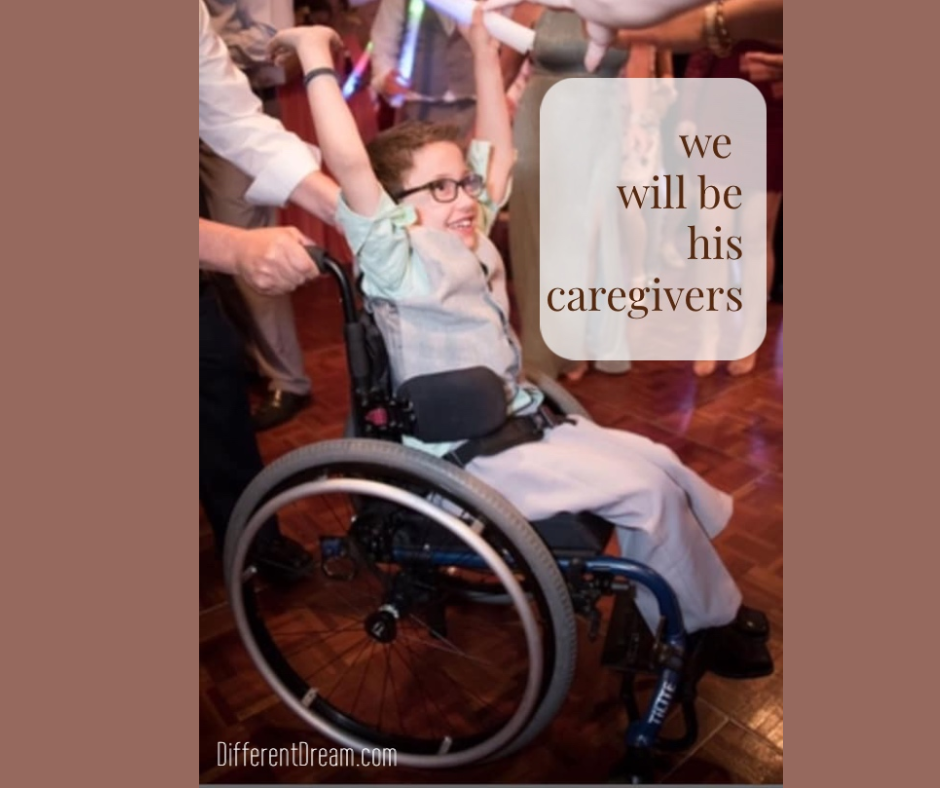Cerebral Palsy Means No Empty Nest

Cerebral palsy means no empty nest for parents like Trish Shaeffer, today’s guest blogger. March was Cerebral Palsy Awareness Month, which led to some soul-searching for Trish.
Cerebral Palsy Awareness Month led me to a realization that is in many of our minds as caregivers and parents. Cerebral palsy means no empty nest, a reality that worries and scares us to the core somedays. A reality we sometimes face when we look at our child Alex. I wanted to be honest and and open book and share my thoughts about what I personally deal with.
I see my oldest son being accepted into dental school courses. Alex’s twin became class president and is working on his violin solos. Watching them, I am reminded that cerebral palsy means no empty nest for us.
Cerebral palsy comes in many forms. For Alex it’s severe spastic quad cerebral palsy. This means his body is fully effected and he is in a wheelchair. He also has epilepsy and an intellectual disability. Walking and standing are very hard for him and he needs someone to hold on to him when he uses his walker for short transfers.
He cannot do many simple tasks that we take for granted. Such as taking a bath, or brushing his teeth. Some days he has seizures. And he has a baclofen pump in his body that has to be refiled every few months. He has a lot of medical conditions, such as asthma and heart issues, that need to constantly be monitored.
He also has trouble writing and reading. Even talking sometimes is a challenge. A lot of times, he can not even communicate when he hurts or is ill. Its sometimes a guessing game.
All this comes with the sad reality that Alex may never be fully independent and on his own. We hope that he will be. We want nothing more than him to be out on his own. We want him to be happy.
But a crushing reality stares us down everyday. While our other two children grow older and more independent, we are left with the nagging thought of Alex always needing us.
He can do some things on his own and in his own way. Like dressing himself and wheeling himself around. But, there are many things Alex may not be able to do. Like balance a checkbook, drive, or cook. Someone has to lift him and help him transfer in and out of things such as a car and his chair. He will probably always need someone there at all times to help him, whether it’s us or a nurse. So we talk often about how we will care for Alex in the future and set him up in life.
Cerebral palsy means no empty nest, but not all is negative.
I’ll always have a buddy and partner in crime. We plan to get an RV and travel with Alex all over the United States once our other two are grown. We are setting up funding so Alex will get the help and care he needs once he is 18.
We also have a tight-knit community, with people just like Alex to guide us into the future. To talk to. To share our stories with.
And we have his two brothers that care for and love Alex. They enjoy helping him with whatever he needs. For ten years Alex has been working on skills in therapy, at school, and at home to become more independent. Such as using an iPad to write, learning to snap and zip his jacket, using adaptive equipment such as an auto access seat to get out of his handicap van and transfer to his wheelchair, using a stair lift to get himself up and down stairs, and so much more.
We choose to focus on our future RV travels when we get sad or defeated when reality comes knocking. We focus on the positive steps Alex is taking to be come more independent.
Because it’s all about perception.
Some days are harder than others. We don’t know what the future holds. But we do know that Alex is a fighter, and he has a fire in his soul.
We will be his caregivers, cheerleaders, and biggest supporters. Despite not being empty nesters. Despite the challenges he faces. ?
Do you like what you see at DifferentDream.com? You can receive more great content by subscribing to the monthly Different Dream newsletter and signing up for the daily RSS feed delivered to your email inbox. You can sign up for the first in the pop up box and the second at the bottom of this page.

By Trish Shaeffer
Trish Shaeffer is the mom of 3 active boys with special needs. She’s a peer supporter for Parent to Parent and volunteers with the United Cerebral Palsy Network, Special Olympics, and the United Way. She’s also an equine volunteer at Leg Up Farm. She’s married to her best friend and biggest supporter, Chris Schaeffer.
2 Comments
Submit a Comment
Related Posts
The Lessons I Learned while Raising a Child with EA/TEF
Jolene Philo reflects on a lifetime of lessons learned while raising a child with EA/TEF and shares the insights she’s won.
Looking Back at Your Child’s EA/TEF Journey
Looking back at your child’s EA/TEF journey can give parents a new perspective about past events. Guest blogger Maggi Gale shares how her look back clearly showed her how God was with their family during their daughter’s very unusual first weeks of life in 2002. Three...
How Do I Let Go of My Adult EA/TEF Child?
Valeria Conshafter explores the question “How do I let go of my adult EA/TEF child?” for EA/TEF Awareness Month.






Monica, I’m so glad this post was an encouragement to you. You are wise to cherish the time you have with her and to prepare for her care when you are gone.
Thank you for this honest and uplifting take on life as a lifetime caregiver. My husband and I are facing the same with our amazing 18 year old daughter. As parents who started a family late in life I worry most about what life will be like for her when we are no longer around to care for her. In the meantime we are cherishing every moment, even the difficult ones.